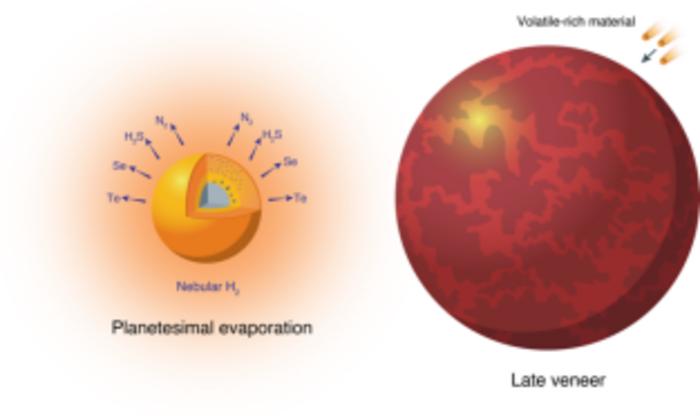A research team led by Prof. WANG Wenzhong from the School of Earth and Space Sciences of the University of Science and Technology of China (USTC), in collaboration with international scholars, studied the fractionation behavior of nitrogen isotopes during the accretionary evolution of terrestrial planets. The study was published in Nature Communications.

Credit: ustc
A research team led by Prof. WANG Wenzhong from the School of Earth and Space Sciences of the University of Science and Technology of China (USTC), in collaboration with international scholars, studied the fractionation behavior of nitrogen isotopes during the accretionary evolution of terrestrial planets. The study was published in Nature Communications.
Currently, the academic community primarily holds two models regarding the accretion of volatiles on Earth: the “Late Veneer” model and the “Early Evolution” model.
As nitrogen is one of the fundamental building blocks of life on Earth, a thorough examination of its accretionary and evolutionary history holds immense significance in comprehending the origin of life-related elements and the evolution of habitability on our planet.
Researchers employed first-principles calculation methods to delve into the fractionation mechanism of nitrogen isotopes (14N and 15N) during the condensation of nebula materials into planetary embryos. The primary focus was on the two stages of melting-volatilization and core-mantle differentiation.
Researchers discovered that under the condition where hydrogen gas had not yet fully dissipated in the early solar nebula, melting-volatilization caused the enrichment of 14N in the planetary embryos, while core-mantle differentiation led to the enrichment of 15N in the silicate melt.
By combining first-principles calculations and observational data, researchers found that the evolution of early planetary embryos alone cannot fully explain the nitrogen isotope composition of the silicate Earth. It is necessary to consider the late-stage addition of volatile-rich materials (such as carbonaceous chondrites). The nitrogen abundance of the silicate Earth is a result of both early evolution and late-stage accretion, but the contribution of late-stage accretion to the abundance of other volatiles is limited.
This research sheds light on the fact that the two crucial stages of early planetesimal melting-volatilization and late accretion of volatile-rich materials jointly determine the nitrogen abundance in the silicate Earth, offering fresh perspectives on the understanding of the origin of volatiles on Earth.



